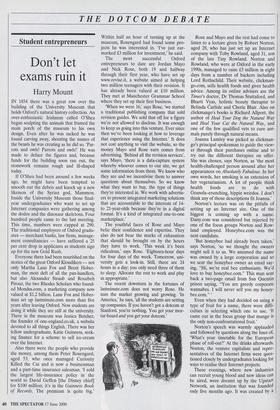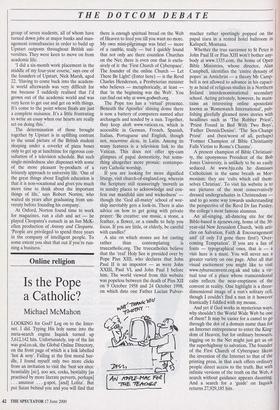THE DOTCOM DEBATE
Student entrepreneurs
Don't let exams ruin it
Harry Mount
IN 1854 there was a great row over the building of the University Museum that holds Oxford's natural history collection. An over-enthusiastic Irishman called O'Shea began sculpting the animals that framed the main porch of the museum to his own design. Even after he was sacked he was found carving away, shouting the names of the beasts he was creating as he did so. 'Par- rots and owls! Parrots and owls!' He was made to deface the figures and, because funds for the building soon ran out, the stonework remains rough and ill-shaped today.
If O'Shea had been around a few weeks ago, he might have been tempted to smooth out the debris and knock up a new likeness of the Syrian god, Mammon. Inside the University Museum those final- year undergraduates who want to set up Internet companies were gathering among the dodos and the dinosaur skeletons. Four hundred people came to the last meeting. This time, numbers were capped at 290. The traditional employers of Oxford gradu- ates — merchant banks, law firms, manage- ment consultancies — have suffered a 25 per cent drop in applicants as students sign up for the new Gold Rush.
Everyone there had been nourished on the stories of the great Oxford Klondikers — not only Martha Lane Fox and Brent Hober- man, the most deft of all the pan-handlers, but also Alexander Straub and Rouzbeh Pirouz, the two Rhodes Scholars who found- ed Mondus.com, a marketing company now valued at $1.2 billion. Lane Fox and Hober- man set up lastminute.com more than five years after leaving Oxford. Now students are doing it while they are still at the university. There in the museum was Jessica Butcher, the founder of one-england.co.uk, a website devoted to all things English. There was her fellow undergraduate, Katie Guinness, seek- ing finance for a scheme to sell ice-cream over the Internet.
Also there were the people who provide the money, among them Peter Rosengard, aged 53, who once managed Curiosity Killed the Cat and is now a businessman and a part-time insurance salesman. 'I sold the largest life-insurance policy in the world to David Geffen [the Disney chief] for $100 million; it's in the Guinness Book of Records. The premium is quite big.' Within half an hour of turning up at the museum, Rosengard had found some pro- jects he was interested in. 'I've just ear- marked £3 million for investment,' he said.
The most successful Oxford entrepreneurs to date are Jordan Mayo and Nick Rose, both 19 and halfway through their first year, who have set up www.revise.it, a website aimed at helping two million teenagers with their revision. It has already been valued at £10 million. They met at Manchester Grammar School where they set up their first business.
'When we were 16,' says Rose, `we started a traditional publishing company that sold revision guides. We sold that off for a figure we're not allowed to disclose. It was enough to keep us going into this venture. Ever since then we've been looking at how to leverage that experience using the Internet.' It does not cost anything to visit the website, so the money Mayo and Rose earn comes from advertising. 'Behind all the revision services', says Mayo, 'there is a data-capture system whereby whoever comes to our site, we get some information from them. We know who they are and we incentivise them to answer questions about themselves. So we know what they want to buy, the type of things they're interested in. We work with advertis- ers to present integrated marketing solutions that are accountable to the interests of 14- to 21-year-olds because they're in a digital format. It's a kind of integrated one-to-one marketplace.'
The youthful faces of Rose and Mayo belie their confidence and expertise. They also do not bear the marks of exhaustion that should be brought on by the hours they have to work. `This week it's been ridiculous,' says Rose. `Eighteen-hour days for four days of the week. Tomorrow, uni- versity gets a look-in. Still, there are 24 hours in a day; you only need three of them to sleep. Allocate the rest to work and play as appropriate.'
The recent downturn in the fortunes of lastminute.com does not worry Rose. He sees the market growing and growing. 'In America,' he says, 'all the students are setting up companies. If you haven't got a dotcom at Stanford, you're nothing. You get your mor- tar-board and you get your dotcom.' Rose and Mayo and the rest had come to listen to a lecture given by Robert Norton, aged 28, who has just set up an Internet company with Toby Rowland, aged 31, son of the late Tiny Rowland. Norton and Rowland, who were at Oxford in the early 1990s, managed to raise £3 million in eight days from a number of backers including Lord Rothschild. Their website, clickman- go.com, sells health foods and gives health advice. Among its online advisers are the Times's doctor, Dr Thomas Stuttaford, and Bharti Vyas, holistic beauty therapist to Belinda Carlisle and Cherie Blair. Also on clickmango's books is Richard Allport, the author of Heal Your Dog the Natural Way and Heal Your Cat the Natural Way, and one of the few qualified vets to cure ani- mals purely through natural means.
Joanna Lumley was picked as clickman- go's principal spokesman to guide the view- er through their purchases online and to try out the different therapies on offer. She was chosen, says Norton, as 'the most health-challenged person around after her appearances on Absolutely Fabulous. In her own words, her smoking is an extension of her vegetarianism. A lot of people think health foods are to do with Granola–crunching, hippie weirdos. I don't think any of those descriptions fit Joanna.'
Norton's lecture was on the pitfalls of setting up an Internet site. One of the biggest is coming up with a name. Daisy.com was considered but rejected by one of the focus groups Norton and Row- land employed. Honeybee.com was the next candidate.
`But honeybee had already been taken,' says Norton, 'so we thought the owners might sell it to us. We assumed the name was owned by a large corporation and so we sent the honeybee owner an email say- ing, "Hi, we're real bee enthusiasts. We'd love to buy honeybee.com." This man sent back a two-page email from San Quentin prison saying, "You are greedy corporate wannabes. I will never sell you my honey- bee.com." ' Even when they had decided on using a type of fruit for a name, there were diffi- culties in selecting which one to use. 'It came out in the focus group that mango is the only non-confrontational fruit.'
Norton's speech was warmly applauded and followed by questions along the lines of. 'What's your timetable for the European phase of roll-out?' At the drinks afterwards. Norton, the venture capitalists and repre- sentatives of the Internet firms were ques- tioned closely by undergraduates looking for ways to realise their Internet projects. These evenings, where new industries can recruit young blood and new ideas can be aired, were dreamt up by the Upstart Network, an institution that was founded only five months ago. It was created by a
THE DOTCOM DEBATE
group of seven students, all of whom have turned down jobs at major banks and man- agement consultancies in order to build up Upstart outposts throughout British uni- versities. They were keen to move on from academic life.
'I did a six-month work placement in the middle of my four-year course,' says one of the founders of Upstart, Nick Marsh, aged 22. 'Having to come back into the academ- ic world afterwards was very difficult for me because I suddenly realised that I'd grown out of the academic world and was very keen to get out and get on with things. It's come to the point where finals are just a complete nuisance. It's a little frustrating to write an essay when our hearts are really set on doing this.'
The determination of those brought together by Upstart is in uplifting contrast to the usual picture of the British student sleeping under a coverlet of pizza boxes only to get up at lunchtime for rigorous con- sultation of a television schedule. But such single-mindedness also dispenses with some of the more pleasant by-products of a leisurely approach to university life. 'One of the great things about English education is that it is non-vocational and gives you much more time to think about the important things of life,' says Robert Norton, who waited six years after graduating from uni- versity before founding his company.
At Oxford, Norton found time to work for magazines, run a club and act — he played Cleopatra's eunuch in an Ian McK- ellen production of Antony and Cleopatra. 'People are privileged to spend three years in the company of intelligent people. To some extent you shut that out if you're run- ning a business.'











































































 Previous page
Previous page